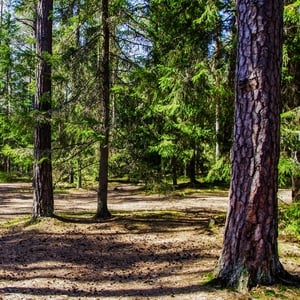Can Trees Help Tackle Climate Change?

There are many good reasons to plant trees in the garden. They offer an abundance of benefits, from landscaping and edible produce to shade and habitat, enhancing the beauty and utility of virtually any outdoor space. Of course, they’re also pillars of the world’s forests.
With climate change an increasingly urgent issue worldwide, there’s more reason than ever to plant trees. A growing body of evidence shows that, as well as reducing carbon emissions, there is a need to pull carbon out of the atmosphere, and researchers are now looking to trees as one means of tackling this issue.
Do trees absorb carbon dioxide?
Trees pull carbon out of circulation in the atmosphere through a process known as carbon sequestration. All land plants do this, but the large mass and woody form of trees makes them better equipped to make an impact through this mechanism.

The carbon doesn’t magically disappear, however. It is stored until the tree eventually stops growing, and is re-released into the atmosphere when the wood is burned or broken down. Still, the long-lived nature of trees means they can theoretically take carbon out of circulation for decades or even centuries. Large areas of old-growth forest are ideal candidates for this, highlighting the importance of forest conservation in combating climate change.
We can’t instantly create old-growth forests in our backyards. Even so, there are clear benefits to creating long-term plantings of suitable trees wherever possible, as well as conserving existing forests and regenerating damaged ones.
What about soil?
Healthy soils rich in organic matter, such as those found in established forest ecosystems, also have the capacity to store high volumes of carbon. Again, this is a complex topic, but research shows that maintaining thriving, organically rich soils may be vital to combating climate change.
Being major contributors to soil formation, trees have a key role to play in this process. They improve soil health in a number of ways including:
- Maintaining inputs of organic matter to the soil (including droppings from visiting animals)
- Increasing the prevalence of soil organisms
- Minimising erosion
- Improving water absorption
- Moderating soil temperatures and much more.
In doing this, trees assist soil in sequestering more carbon. What’s more, healthy soil feeds back to support healthy trees, which are then able to grow larger, live longer, and sequester more carbon themselves, further amplifying the benefits.

What are the best trees for carbon sequestration?
When planting trees for carbon sequestration, you’ll want to go for a species that’s as large and long-lived as possible within the constraints of your space and positioning. If you plant a variety that won’t be manageable in maturity or won’t thrive, its lifespan is more likely to be cut short. Keeping the future in mind is always a good rule of thumb for any tree planting.
The festive season offers a great incentive to put in a tree. A Wollemi Pine makes a perfect living Christmas tree or special gift, as they’re quite happy living in a pot indoors for an extended period. If you have a big enough garden, plant it out once the festivities are over. Growing naturally in the ground, they can get up to 20m tall over an exceptionally long lifespan. These rare trees are low maintenance, hardy and versatile, and a great way to neutralise your Christmas tree carbon footprint.
A greener future
While the relationship between trees and carbon dioxide is complex, there’s virtually nothing to be lost by growing a tree. Many gardeners will agree that this is one of the most rewarding long term garden projects you can undertake – and if it helps tackle climate change in the process, then all the better.








Comments are closed.